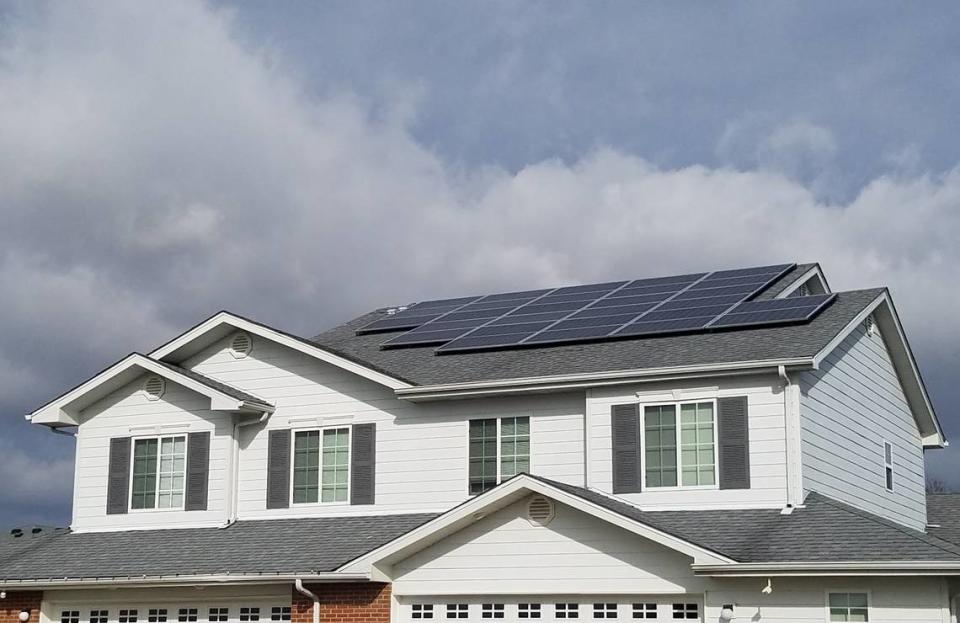Kansas homeowners seek lawmakers’ help overriding HOA rules governing solar panels
Nearly four years ago, Wichita resident Jeff Terhune sought approval from his local homeowner’s association to install solar panels on his home. He hoped to save money on his utility bills, take advantage of federal tax credits and reduce his carbon footprint.
He was told the solar panels could not be installed on the front of the house, so he opted to install them on the side of his garage and on the back of the house. Installation cost around $19,000, a relatively cheap price compared to other estimates.
But over a year later, Terhune’s HOA told him he must reinstall the panels in the back of the house, a costly endeavor. He refused.
Since then, Terhune has accumulated thousands of dollars in homeowner’s association fees, and said he now faces a costly lawsuit for refusing to remove the solar panels from his home, which has saved him an estimated $6,000 on his utility bills since they were installed.
“I don’t feel it’s just,” he said. “One man, the developer, cannot decide for the whole. I don’t think it’s right.”
Last week, Terhune testified in the Kansas House Committee on Local Government in favor of a bill that would prevent HOAs from flat prohibiting the installation of solar panels. Any rules that affect the panel’s efficiency, restrict the panel’s use or impair its function would also be prohibited.
Twenty-nine states, including Missouri, have enacted laws protecting solar access in neighborhoods governed by an HOA board. Many of those laws, including the proposed Kansas legislation, still allow homeowners associations to put in place “reasonable restrictions” on solar panels, such as requiring them to be a certain color, to conceal cables and ensure they are fitted well to the roof.
Although no one testified against the measure, it was met with hesitation from some lawmakers, who said that people can choose whether to live in an area governed by an HOA. Rep. Carrie Barth, a Baldwin City Republican, said a process already exists to bring forth concerns with their HOAs, so it is not necessary for the state to interfere.
Homeowners should read their HOA agreements before agreeing to move to that area, especially since they are clearly notified by real estate agents and Board leadership about aesthetic expectations, she said.
“If you’re buying a house in a community, you know what you’re getting into,” Barth said.
But Alan Bauman, a Prairie Village resident, moved into his home 30 years ago, when he said solar power was not nearly as well known. He said he was upset by some lawmakers’ comments.
HOA meetings are poorly publicized and information booklets are sent out just once a year, he said. As a physician, he said he did not have time to read a 72-page manual unless he needed to specifically reference something.
“Several of the members said homeowners should read their HOA requirements,” he said. “I’ve lived in my house for 30 years. There was nothing about solar – this was passed after I moved in. I don’t want to move to another subdivision just because of this one issue.”
Proponents of the bill argued that many HOA rules governing solar panels are outdated and must be updated to properly address technological developments, such as a “thinner, sleeker” appearance. Not only can it help customers save money on utilities, but it also props up local solar businesses, they said.
They emphasized they were not asking for blanket freedom to install solar panels, only asking HOAs to write rules that were reasonable.
Malcolm Proudfit, The CEO of Good Energy Solutions, a solar energy contractor, said the heart of the issue lies in restricting the individual and financial freedoms of homeowners to use solar technology.
“This bill places the power back into the hands of individual homeowners to control their carbon footprint and to save money by accessing the abundant solar resource that we all have.”


